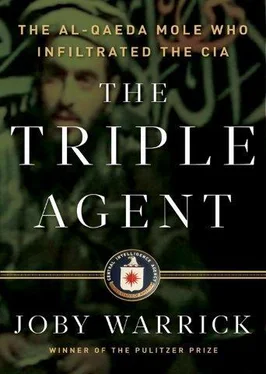She studied the item, habitually fingering the thick shock of brown hair that spilled across her forehead. Was this the kind of place she wanted to be? Matthews was forty-four now but looked younger, her body lean from years of running and her angular features showing no trace of wrinkles. She was nowhere near retirement, but after two decades of CIA work, her career choices were becoming increasingly momentous. If nothing else, another overseas posting would mean a better pension when the time finally came.
Still. Afghanistan .
Matthews sat back in her chair and stared into the gloom outside her window. Office workers were slogging through the square with their umbrellas, and some of them would be heading to pubs later that day for celebrations marking the end of George W. Bush’s presidency. Glad though she was to see certain members of Bush’s security team leave town, Matthews would not be celebrating. She reserved great disdain for Bush’s former defense secretary, Donald Rumsfeld, one of a half dozen men she blamed for letting Osama bin Laden slip away when the CIA had had the terrorist in its crosshairs. But the prospect of an Obama presidency had been more unsettling to some of her former comrades in the agency’s Counterterrorism Center. Candidate Obama had condemned the agency’s past use of waterboarding and had even called it torture, suggesting that investigations, public hearings, and even criminal charges were on the agenda.
Matthews knew about waterboarding. She had spent weeks by the side of Abu Zubaida, the man who became renowned as the first high-value al-Qaeda prisoner to be subjected to the procedure, in a controversial, secret prison overseas. As one of the CIA’s leading al-Qaeda experts she had fed questions to the interrogators as they did their work. She had been pregnant at the time and became so sick afterward that her doctors worried about the health of her unborn baby.
But underlying her anxiety about the torture case was an even deeper secret, one that had gnawed at her for four years and followed her to London when she accepted the CIA’s liaison post in 2005. Thousands of miles from CIA headquarters, in the heart of one of the world’s great cities, she had plunged into her new role with an intensity that left her physically and emotionally spent, yet it was clear when a lawyer friend from the CIA General Counsel’s Office stopped by for a visit that the old pain still raged.
“I can’t get this thing out of my head,” she told him, fighting back tears. Matthews had gone over the details many times, with this friend and others. The lawyer offered reassurance but quickly concluded that it was hopeless. “She was haunted,” he later said.
The reasons for Matthews’s anguish were well known within the CIA, where roughly two dozen other officers carried the same burden. After the September 11, 2001, terrorist attacks the CIA’s internal watchdog, the Office of the Inspector General, had launched a wide-ranging investigation into how the intelligence agency had failed to uncover the al-Qaeda plot to hijack four airliners and crash them into buildings. Other U.S. departments shared in what was arguably a government-wide failure, but the agency’s probe homed in on CIA missteps that had allowed two of the nineteen hijackers to enter the United States undetected.
Leading the probe was career CIA analyst John L. Helgerson, a quietly amiable former college professor who surprised his peers by becoming one of the most aggressive and fiercely independent inspectors general in the agency’s history. Helgerson concluded that the CIA’s Counterterrorism Center had failed to respond to a series of cabled warnings in 2000 about two al-Qaeda operatives who later became part of the September 11 plot. The first warning came in January of that year, when the two operatives, Nawaf al-Hazmi and Khalid al-Mihdhar, were observed attending a meeting of suspected terrorists in Malaysia. Soon afterward the CIA learned that one of the men had obtained a U.S. visa, and the other had apparently already entered the United States. The cables were seen by as many as sixty CIA employees, yet the two operatives’ names were never passed along to the FBI, which might have assigned agents to track them down, or shared with the State Department, which could have flagged their names on its watch list. In theory, the arrest of either man could have led investigators to the other hijackers and the eventual unraveling of the 9/11 plot.
Helgerson’s report named individual managers who it said bore the greatest responsibility for failing to ensure that vital information was passed to the FBI. The report, never released in full, also recommended that some of the managers be reviewed for possible disciplinary action.
Jennifer Matthews was on that list.
The report ignited a furor at CIA headquarters as top agency officials pushed back sharply against Helgerson’s call for individual accountability. It was unfair, Helgerson’s critics argued, to tarnish a few managers for what had been a collective failure. The agency’s director at the time, Porter Goss, decided the matter by formally rejecting disciplinary reviews. He then ordered that Helgerson’s list of names remain classified.
From the reprieved officers came a collective sigh of relief. But Matthews would not be consoled. It galled her that she, one of a handful of dedicated al-Qaeda experts in the CIA before 2001, had been accused of failing to take al-Qaeda seriously. Matthews believed the opposite was true: She had been among the few who had recognized the threat posed by Osama bin Laden in the 1990s. Like others in the agency’s al-Qaeda unit, she faulted the country’s political leaders for missing numerous chances to kill or capture the Saudi terrorist.
It was abhorrent to Matthews that her name would be forever linked to one of the worst intelligence failures in U.S. history. The jagged sliver continued to bore into her psyche years later in London, long after public interest in the agency’s pre–September 11 failures had dried up.
As Matthews sat in her sparsely furnished office overlooking Grosvenor Square, she could see how it would all unfold. A leak that revealed her name as one of the culpable. A media flurry. A ruined career. And, most painful to contemplate, public disgrace.
“The worst part was that her children would know,” said the CIA lawyer who visited with her. “She would be indelibly tarnished, forever linked to the failures of September 11.”
London had served as a welcome respite for Matthews and her family, at a time when she really needed it. She had relished her long weekends and holidays traveling with the family around Europe. She savored repeat performances of her favorite musical, Les Miserables , on the London stage, and she bought cases of French wine to add to a growing collection back home. At work, Matthews was caught up in the investigations of several international terrorism plots, including the 2006 al-Qaeda plan to blow up commercial airliners using liquid explosives. British colleagues came to respect her knowledge of the subject matter and quickly adjusted to her take-no-prisoners style. “I could always tell which of my office mates had met with Jennifer on any day,” one British intelligence officer would later recall. “It was always the busiest person in the room.”
But now it was over, and Matthews was torn over what to do next. Most of the typical slots for someone with her background involved a desk somewhere back in Langley, an unappealing prospect for multiple reasons. Career-wise she was near the top of the government’s civilian pay scale, yet she lacked the experience in key areas necessary to make the jump into upper management, the so-called senior executive service, where minimum salaries start at $111,000 a year.
Читать дальше












